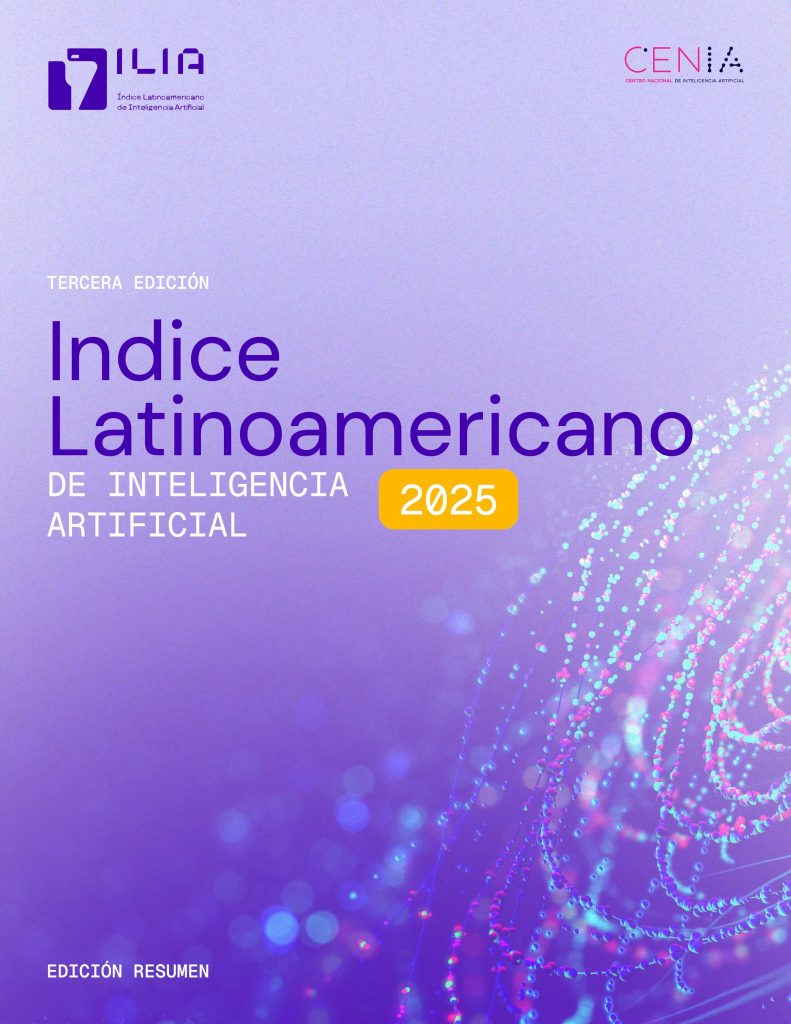The Latin American Artificial Intelligence Index (ILIA) shows the progress of artificial
intelligence in 19 countries of Latin America and the Caribbean and provides an overview
of key aspects for AI development for people good.
The Latin American Artificial Intelligence Index (ILIA) shows the progress of artificial
intelligence in 19 countries of Latin America and the Caribbean and provides an overview
of key aspects for AI development for people good.

The ILIA is composed of three dimensions: A) Enabling Factors, B) Research,
Development, and Adoption, and C) Governance. The first one addresses elements of
digital infrastructure, data, and human talent — essential aspects that enable the
deployment of AI. The second includes elements of the academic and entrepreneurial
ecosystem, as well as the adoption of AI in different sectors. Finally, the third considers
institutional and regulatory elements for the responsible and sustainable governance of AI in the countries.
This edition highlights the accelerated economic improvement in countries such as Ecuador, Costa Rica, the Dominican Republic, and Guatemala, where nations in earlier stages of maturity are catching up quickly.

This edition highlights the accelerated economic improvement in countries such as Ecuador, Costa Rica, the Dominican Republic, and Guatemala, where nations in earlier stages of maturity are catching up quickly.
This acceleration is especially evident in Central American and Caribbean countries, where ecosystems have improved in infrastructure –including faster download speeds, 5G coverage, and IPv6 adoption– along with advances in human talent through greater focus on AI in school education, postgraduate programs, and professional skills.
Improvements are also reflected in academic research, open-source development indicators, and the progress of national AI strategies, some recently published and others still in development.
As countries strengthen their capabilities, new opportunities are emerging for less asymmetrical regional alliances and multilateral collaborations that were previously unlikely.
From the perspective of Latin American integration, this technological awakening also challenges leading countries to adopt a more active and strategic role in cooperation, preventing the region from deepening its historical digital and technological fragmentation.
The open-source model continues to represent a major opportunity for AI development in the region, as it enables the creation of local solutions without relying on proprietary licenses or expensive infrastructure, while also promoting collaboration within the developer community.

The strong performance of countries such as Honduras, El Salvador, and Cuba in productivity, quality, and relevance of open-source production, respectively, is a concrete example of the opportunities this model offers to all countries in the region. Open-source development strengthens regional cooperation, collective learning, and algorithmic transparency.
This opportunity is reinforced by application development, which acts as a gateway for AI deployment. Fifteen of the nineteen countries show strong results in this area, demonstrating that app development is more equitable than research or advanced computing and represents an opportunity to integrate AI into digital products even in ecosystems at earlier maturity stages.
Although Latin America and the Caribbean produce large volumes of data from public, private, and social systems, much of this information is not available for AI-based solution development.

While the region has made significant progress in data capacity and governance, data availability remains a weakness in most countries. Notable exceptions such as Ecuador, Guatemala, Peru, and Paraguay show significant and consistent improvement.
This gap between data generation and availability limits the development of local solutions, reduces government transparency, and restricts progress in open science and artificial intelligence. Without stronger data ecosystems built on openness and standardization, algorithmic decisions risk being based on incomplete or biased datasets, which can negatively affect equity and policy effectiveness.
ILIA scores show that AI literacy levels are nearly twice as high as professional training and four times higher than advanced specialized talent.

This suggests a broad base of general understanding, but also a bottleneck in technical and advanced skills that limits the development of highly qualified talent.
Educational efforts show progress, with increases in school-level AI education and postgraduate programs, but these remain exceptions in the region. In terms of growth among AI-skilled professionals, Costa Rica is developing at a pace closer to the global average, while other countries in Latin America and the Caribbean are falling behind and progressing more slowly.
The key challenge for countries is transforming early literacy into more sophisticated academic and professional skills. Without specialization, the region risks remaining a consumer of AI rather than a contributor with meaningful influence on its development.
Countries in Latin America and the Caribbean face significant challenges in strengthening their internal capacities to develop and adopt AI.

In terms of computing power, Brazil accounts for more than 90% of the regional total and has 17 times more capacity than the country with the lowest number of teraflops per second. Although GPU capacity per capita provides a more favorable outlook for countries such as Uruguay, Costa Rica, and Colombia, more than half of the region still lacks high-performance infrastructure, highlighting a highly uneven landscape.
Despite some progress, 13 out of the 19 ILIA countries do not yet include early AI skills in school curricula, and 11 of the 19 have no doctoral-level AI programs in their universities.
Infrastructure and talent are essential to a country’s ability to deploy and adopt artificial intelligence. While infrastructure sets the upper limit for what can be developed—particularly in relation to computing power—human talent is what ultimately transforms potential into impact. Without advances in building these internal capabilities, countries risk producing AI solutions that are biased and poorly adapted to local needs.
Generative AI platforms have helped democratize access and accelerate adoption thanks to their low barriers to entry and new dynamics of value creation. These tools allow non-experts to interact and learn through advanced models using user-friendly interfaces accessible to the general public.

This is evidenced by countries that stand out in generative AI adoption—Chile, Costa Rica, Peru, Uruguay, Panama, and the Dominican Republic—showing that access to AI is no longer limited to major technology hubs. Latin America and the Caribbean is the world’s third-largest region in terms of downloads, maintaining a consistent 15%–20% share of the global market.
Generative AI’s accessibility can act as a catalyst for broader AI adoption, extending its impact on people’s daily lives. More evenly distributed capabilities across the region—such as generative AI use, software development, and open-source contributions—can help offset the disparities seen in computing power, opening diverse pathways for progress across Latin America and the Caribbean.
Despite AI’s potential to transform how citizens participate in governance, its use in digital democracy tools remains limited in the region.

While Colombia, Mexico, and Peru show comparatively greater adoption in participatory processes, 8 of the 19 ILIA countries report no use cases at all. This reflects a gap between government interest in emerging technologies—where most applications focus on informational chatbots—versus practical tools for public consultation, accountability, or co-creation of policy.
Using language models in participatory contexts opens new possibilities for democracy, enabling the processing and synthesis of contributions from large numbers of people during public consultations or policy-making processes
It can also help make legislative processes more accessible, strengthening accountability. AI thus offers a transformative shift in citizen participation, and the current scarcity of use cases highlights a significant opportunity to deepen democratic engagement through digital means.
As with private investment, academic research in the region remains limited and concentrated in only a few countries.

Brazil and Mexico together account for 68% of all active AI researchers in the region, and 87% of them are concentrated in just five countries: Brazil, Mexico, Colombia, Chile, and Argentina. These same five countries also represent 90% of the researchers who publish consistently in AI. Moreover, only seven countries have a presence in the main tracks of top international AI conferences, with 82% of all regional authors coming from Brazil and Chile.
This limited presence in high-impact academic spaces not only restricts the global visibility of Latin American AI research but also reduces opportunities for knowledge exchange and collaboration with the rest of the world. Strengthening academic activity remains one of the most critical challenges, requiring increased focus and investment across most countries in the region.
Although nine countries have national AI strategies, only a minority have taken steps toward updating them, allocating budgets for implementation, or establishing concrete plans to ensure they are carried out effectively.

While three countries are currently drafting policies, seven still lack a defined roadmap or national strategy for AI development.
Developing a policy is an essential first step, but it is not enough. Without clear implementation plans, these documents risk becoming aspirational statements with limited budget alignment, no impact indicators, and weak evaluation mechanisms.
This lack of execution leads to notable inconsistencies: none of the countries that reference gender equity in their AI strategies rank among those with the highest share of women authors in AI; most actively participate in international AI and technology forums, yet often fail to implement agreed-upon commitments; and while cybersecurity frameworks are relatively robust, they do not always translate into operational capacity.
In this context, ensuring that AI governance becomes truly actionable and effective is an urgent priority.
Sustainability stands out as a major challenge in AI deployment, underscoring the urgent need for better data on its environmental impact, including energy consumption and carbon emissions.

When it comes to data centers, only four ILIA countries (Brazil, Chile, Colombia, and Mexico) have a strong data center industry, and only one in five centers in the region complies with international sustainability standards.
To date, sustainability considerations remain largely absent from AI and digital transformation policies, with most national frameworks failing to meaningfully address this issue. Without a timely and comprehensive response, AI development risks undermining sustainable development goals.
A coordinated effort is urgently needed not only to improve measurement of AI’s climate impact, but also to assess the environmental, social, and economic implications of the data center industry across ecosystems.
ILIA findings show that a highly industrialized economy is not a prerequisite for fostering AI development.

The growth of AI companies depends more on investment and entrepreneurial-friendly environments than on the complexity of a country’s productive structure. This creates opportunities for all countries in Latin America and the Caribbean to advance AI integration, whether through established industries or through dynamic entrepreneurship and private investment.
However, the region still faces significant challenges: it attracts only 1.12% of global AI investment, and just six countries in the region currently have unicorn companies.
This edition highlights the accelerated economic improvement in countries such as Ecuador, Costa Rica, the Dominican Republic, and Guatemala, where nations in earlier stages of maturity are catching up quickly. This acceleration is especially evident in Central American and Caribbean countries, where ecosystems have improved in infrastructure –including faster download speeds, 5G coverage, and IPv6 adoption– along with advances in human talent through greater focus on AI in school education, postgraduate programs, and professional skills. Improvements are also reflected in academic research, open-source development indicators, and the progress of national AI strategies, some recently published and others still in development.
As countries strengthen their capabilities, new opportunities are emerging for less asymmetrical regional alliances and multilateral collaborations that were previously unlikely. From the perspective of Latin American integration, this technological awakening also challenges leading countries to adopt a more active and strategic role in cooperation, preventing the region from deepening its historical digital and technological fragmentation.
The open-source model continues to represent a major opportunity for AI development in the region, as it enables the creation of local solutions without relying on proprietary licenses or expensive infrastructure, while also promoting collaboration within the developer community. The strong performance of countries such as Honduras, El Salvador, and Cuba in productivity, quality, and relevance of open-source production, respectively, is a concrete example of the opportunities this model offers to all countries in the region. Open-source development strengthens regional cooperation, collective learning, and algorithmic transparency.
This opportunity is reinforced by application development, which acts as a gateway for AI deployment. Fifteen of the nineteen countries show strong results in this area, demonstrating that app development is more equitable than research or advanced computing and represents an opportunity to integrate AI into digital products even in ecosystems at earlier maturity stages.
Although Latin America and the Caribbean produce large volumes of data from public, private, and social systems, much of this information is not available for AI-based solution development. While the region has made significant progress in data capacity and governance, data availability remains a weakness in most countries. Notable exceptions such as Ecuador, Guatemala, Peru, and Paraguay show significant and consistent improvement.
This gap between data generation and availability limits the development of local solutions, reduces government transparency, and restricts progress in open science and artificial intelligence. Without stronger data ecosystems built on openness and standardization, algorithmic decisions risk being based on incomplete or biased datasets, which can negatively affect equity and policy effectiveness.
ILIA scores show that AI literacy levels are nearly twice as high as professional training and four times higher than advanced specialized talent. This suggests a broad base of general understanding, but also a bottleneck in technical and advanced skills that limits the development of highly qualified talent.
Educational efforts show progress, with increases in school-level AI education and postgraduate programs, but these remain exceptions in the region. In terms of growth among AI-skilled professionals, Costa Rica is developing at a pace closer to the global average, while other countries in Latin America and the Caribbean are falling behind and progressing more slowly.
The key challenge for countries is transforming early literacy into more sophisticated academic and professional skills. Without specialization, the region risks remaining a consumer of AI rather than a contributor with meaningful influence on its development.
Countries in Latin America and the Caribbean face significant challenges in strengthening their internal capacities to develop and adopt AI. In terms of computing power, Brazil accounts for more than 90% of the regional total and has 17 times more capacity than the country with the lowest number of teraflops per second. Although GPU capacity per capita provides a more favorable outlook for countries such as Uruguay, Costa Rica, and Colombia, more than half of the region still lacks high-performance infrastructure, highlighting a highly uneven landscape.
Despite some progress, 13 out of the 19 ILIA countries do not yet include early AI skills in school curricula, and 11 of the 19 have no doctoral-level AI programs in their universities.
Infrastructure and talent are essential to a country’s ability to deploy and adopt artificial intelligence. While infrastructure sets the upper limit for what can be developed—particularly in relation to computing power—human talent is what ultimately transforms potential into impact. Without advances in building these internal capabilities, countries risk producing AI solutions that are biased and poorly adapted to local needs.
Generative AI platforms have helped democratize access and accelerate adoption thanks to their low barriers to entry and new dynamics of value creation. These tools allow non-experts to interact and learn through advanced models using user-friendly interfaces accessible to the general public. This is evidenced by countries that stand out in generative AI adoption—Chile, Costa Rica, Peru, Uruguay, Panama, and the Dominican Republic—showing that access to AI is no longer limited to major technology hubs. Latin America and the Caribbean is the world’s third-largest region in terms of downloads, maintaining a consistent 15%–20% share of the global market.
Generative AI’s accessibility can act as a catalyst for broader AI adoption, extending its impact on people’s daily lives. More evenly distributed capabilities across the region—such as generative AI use, software development, and open-source contributions—can help offset the disparities seen in computing power, opening diverse pathways for progress across Latin America and the Caribbean.
Despite AI’s potential to transform how citizens participate in governance, its use in digital democracy tools remains limited in the region. While Colombia, Mexico, and Peru show comparatively greater adoption in participatory processes, 8 of the 19 ILIA countries report no use cases at all. This reflects a gap between government interest in emerging technologies—where most applications focus on informational chatbots—versus practical tools for public consultation, accountability, or co-creation of policy.
Using language models in participatory contexts opens new possibilities for democracy, enabling the processing and synthesis of contributions from large numbers of people during public consultations or policy-making processes. It can also help make legislative processes more accessible, strengthening accountability. AI thus offers a transformative shift in citizen participation, and the current scarcity of use cases highlights a significant opportunity to deepen democratic engagement through digital means.
As with private investment, academic research in the region remains limited and concentrated in only a few countries. Brazil and Mexico together account for 68% of all active AI researchers in the region, and 87% of them are concentrated in just five countries: Brazil, Mexico, Colombia, Chile, and Argentina. These same five countries also represent 90% of the researchers who publish consistently in AI. Moreover, only seven countries have a presence in the main tracks of top international AI conferences, with 82% of all regional authors coming from Brazil and Chile.
This limited presence in high-impact academic spaces not only restricts the global visibility of Latin American AI research but also reduces opportunities for knowledge exchange and collaboration with the rest of the world. Strengthening academic activity remains one of the most critical challenges, requiring increased focus and investment across most countries in the region.
Although nine countries have national AI strategies, only a minority have taken steps toward updating them, allocating budgets for implementation, or establishing concrete plans to ensure they are carried out effectively. While three countries are currently drafting policies, seven still lack a defined roadmap or national strategy for AI development.
Developing a policy is an essential first step, but it is not enough. Without clear implementation plans, these documents risk becoming aspirational statements with limited budget alignment, no impact indicators, and weak evaluation mechanisms. This lack of execution leads to notable inconsistencies: none of the countries that reference gender equity in their AI strategies rank among those with the highest share of women authors in AI; most actively participate in international AI and technology forums, yet often fail to implement agreed-upon commitments; and while cybersecurity frameworks are relatively robust, they do not always translate into operational capacity.
In this context, ensuring that AI governance becomes truly actionable and effective is an urgent priority.
Sustainability stands out as a major challenge in AI deployment, underscoring the urgent need for better data on its environmental impact, including energy consumption and carbon emissions. When it comes to data centers, only four ILIA countries (Brazil, Chile, Colombia, and Mexico) have a strong data center industry, and only one in five centers in the region complies with international sustainability standards.
To date, sustainability considerations remain largely absent from AI and digital transformation policies, with most national frameworks failing to meaningfully address this issue. Without a timely and comprehensive response, AI development risks undermining sustainable development goals.
A coordinated effort is urgently needed not only to improve measurement of AI’s climate impact, but also to assess the environmental, social, and economic implications of the data center industry across ecosystems.
ILIA findings show that a highly industrialized economy is not a prerequisite for fostering AI development. The growth of AI companies depends more on investment and entrepreneurial-friendly environments than on the complexity of a country’s productive structure. This creates opportunities for all countries in Latin America and the Caribbean to advance AI integration, whether through established industries or through dynamic entrepreneurship and private investment.
However, the region still faces significant challenges: it attracts only 1.12% of global AI investment, and just six countries in the region currently have unicorn companies.

This section presents the main findings and results of each dimension: Enabling Factors, R+D+A, and Governance.
Measures the progress of those elements that are a necessary condition for an effective development of AI ecosystems. This dimension is composed of three subdimensions: Infrastructure, Data, and Human Talent.
Evaluates the ecosystem of research, development, innovation, and adoption at the public, private, and academic levels. The R+D+A dimension is composed of three subdimensions: Research, Innovation and Development, and Adoption.
Characterizes the situation of the countries in the region in terms of AI institutionality and governance. The governance dimension is composed of three subdimensions: Vision and Institutionality, International Collaboration, and Regulation.
Analiza el avance de la investigación, la innovación y desarrollo, y la adopción de IA a nivel público, privado y académico, lo que inciden en la competitividad de cada país a nivel global.
Analiza el avance de la investigación, la innovación y desarrollo, y la adopción de IA a nivel público, privado y académico, lo que inciden en la competitividad de cada país a nivel global.
Analiza el avance de la investigación, la innovación y desarrollo, y la adopción de IA a nivel público, privado y académico, lo que inciden en la competitividad de cada país a nivel global.
Analiza el avance de la investigación, la innovación y desarrollo, y la adopción de IA a nivel público, privado y académico, lo que inciden en la competitividad de cada país a nivel global.



Access the 2025 edition of ILIA and learn about the main findings on the state of AI in Latin America and the Caribbean.